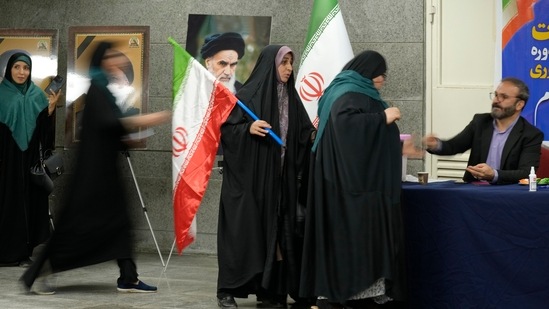5 July 2024 Punjab Khabarnama : The voting for the presidential elections in Iran is currently underway, with the citizens set to choose the successor of former president Ebrahim Raisi through the polls. Voting commenced on Friday at 7 am local time and is expected to end at 6 pm, reported local media. However, voting is usually extended till midnight in some areas due to low turnout and disturbances.
The run-off follows a June 28 ballot with a historic low turnout, when over 60% of Iranian voters abstained from the snap election for a successor to Ebrahim Raisi, following his death in a helicopter crash. The low participation is seen by critics as a vote of no confidence in the Islamic Republic.
The presidential elections in Iran are set to be a tight race between the two key candidates – Masoud Pezeshkian and Saeed Jalili. Pezeshkian was the sole moderate in the original field of four candidates, while Jalili is a hardline former nuclear negotiator.
While the poll will have little impact on the Islamic Republic’s policies, the president will be closely involved in selecting the successor to Ayatollah Ali Khamenei, Iran’s 85-year-old supreme leader who calls all the shots on top state matters.
The presidential elections in Iran are set to be a tight race between the two key candidates – Masoud Pezeshkian and Saeed Jalili. Pezeshkian was the sole moderate in the original field of four candidates, while Jalili is a hardline former nuclear negotiator.
While the poll will have little impact on the Islamic Republic’s policies, the president will be closely involved in selecting the successor to Ayatollah Ali Khamenei, Iran’s 85-year-old supreme leader who calls all the shots on top state matters.
The elections are also of significance due to regional tensions in the Middle East and Iran’s strained relations with the West over Tehran’s nuclear programme.
The voter turnout in Iran has taken a major hit over the last four years, with the support for the Iranian system eroding due to the high inflation, economic hardships and curbs on political and social freedoms. Critics say that the low turnout is a mark of public discontent for the current regime in Iran.
Analysts say that Jalili’s win might lead to increased hostilities with the West, and potentially even more antagonistic domestic and foreign policy. Meanwhile, Pezeshkian might promote a more pragmatic foreign policy and a liberalised regime in the country.
However, many voters are sceptical about Pezeshkian’s ability to fulfil his campaign promises as the former health minister has publicly stated that he had no intention of confronting the powerful security hawks and clerical rulers.

